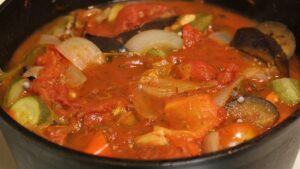What is Marination?
Marination is the process of soaking food in a seasoned or flavored liquid, usually acidic, called a marinade, before cooking. The term originated from the Latin word “sea,” meaning “mare.”
It is primarily used to tenderize the food, add flavors, and enhance the overall taste. The marinating process can last from a few minutes to several days.
While marinades differ across cuisines, the basic process remains the same. No special liquid is required, but certain steps need to be followed.
Key Takeaways
- Marination involves using a seasoned or flavored acidic liquid.
- Different types of marinades are used depending on the food.
- Marination duration and the choice of marinade depend on the type of food.
- Marination is a pre-cooking process that simplifies the overall cooking method.
Understanding Marination

The practice of marination dates back to ancient times, even before the Renaissance.
It can be traced back to the Egyptian civilization, one of the largest civilizations in history. Asians often use marinades with ingredients like soy sauce.
In the Roman era, flavorings were added to food as a whole. Mexicans used papaya as a tenderizer, while the French began marinating with liquid agents.
Some sources suggest that the concept of marination originated from seawater, while others link it to the Italian word “marinare,” meaning “to pickle,” or the French word “mariner,” meaning “to marinate.”
These words imply the use of brine (seawater or aquamarine) in the pickling process. Marinades can be enzymatic (using curd, ginger, papaya, pineapple, etc.) or acidic (using wine, lemon juice, vinegar, etc.).
Additionally, herbs, spices, and oils are often used to flavor the food.
The marination process initially focused on tenderizing meat by breaking down tissues and adding flavor before cooking.
Over time, techniques for tenderizing meat, pickling, and using vinegar were incorporated.
Various cuisines developed their own unique marinades. However, poultry and seafood are not usually marinated extensively, as it can make them mushy.
Marination is commonly used for meats and chicken breasts that are grilled or fried to retain moisture. By adding oil, vinegar, etc., the flavors are preserved and enhance the overall taste of the dish.
Importance of Marination
The marination process involves using marinades composed of oil, vinegar, lemon juice, enzymes, etc., which help tenderize the connective tissues in meat, enhance the flavors, and make the dish more delectable. Let’s delve into the benefits of these marinades:
Tenderness
Marinating any type of meat with acidic marinades helps tenderize it as the soft connective tissues within the meat easily soften.
Salt-based marinades add flavor and make the meat juicy. The salt is absorbed into the food and gradually breaks it down, while the acid breaks down the proteins.
Flavor
Marination adds flavors to meat, fish, poultry, and other ingredients. The marinade is absorbed into the food, releasing all the juices and making it flavorful.
Herbs and spices penetrate the meat, enhancing its taste. Salt penetrates the food, particularly the outer layer, intensifying the flavors.
Moisture
Marinades, especially those with salt, add moisture to both the inner and outer layers of the food.
This moisture helps cook the food perfectly and keeps it juicy. Chicken breasts, when soaked in a salt-based solution, become particularly moist.
Texture
Marination contributes to the overall texture
Removes the Smell
The brine solution, acidic flavors, or enzymatic marinades simply remove the smell of raw meats and fish.
Apart from adding flavors, they also infuse the seasoning aroma into the solution. The acid solution eliminates the metallic taste in meat and removes the thick/hard pungent smell of fish.
Easy Cooking
Marinated food is always easy to cook. It has been observed that marinating and cooking food saves time and simplifies the whole process. The spiciness and aroma required for the dish remain intact.
Whether it’s kebabs, lamb, pork, or fish, marinated ingredients tend to cook quicker than usual, making it convenient, especially for beginners.
Healthier
Marinated food retains its wholesome goodness when cooked. The marination process quickly tenderizes the fish without the need for overcooking.
It eliminates the necessity of adding external liquids, fats, or water. One can simply cook the food in its own juices.
Types of Marination
There are three different types of marination: acidic, dairy, and enzymatic marinade.
Acidic Marinade
This type of marinade includes various juices like citrus, tomato, highly acidic juices, wine, or vinegar.
The acid works to tenderize the protein, but it’s important to be cautious and not marinate the meat for too long, as it can cause the meat to tighten.
Dairy Marinade
Though not accepted by many, some chefs and experts believe that dairy products like yogurt and buttermilk, being acidic, help break down the food and make the meat more tender.
The calcium in these products also activates the enzymes in the meat.
Enzyme Marinade
Certain fruits like papaya, kiwi, and pineapple contain enzymes that make the meat tender and succulent.
Bromelain and papain, found in pineapple and papaya respectively, are chemicals that break down the meat tissues.
Tips for Better Marination
Here are some tips and tricks to enhance the taste of your food:
Acidic components: Ensure that your marinades include acidic components like buttermilk, yogurt, citrus juice, vinegar, or wine to infuse flavors more effectively.
High smoking point: Add oils with high smoking points to the marinade. These oils penetrate the tender tissues, making the grilling or cooking process more efficient.
Refrigerate: It’s important to refrigerate marinated food to prevent dangerous bacteria growth and potential foodborne illnesses. However, avoid refrigerating for an extended period.
Marination time: Each food has a recommended marination time. Meat can be marinated for 30 minutes to overnight, poultry for 25 minutes to 2.5 hours, fish and seafood for 10 minutes, and vegetables for 10 to 25 minutes.
Quantity of marination: Use about 1/5 cup of marinade per pound of vegetables, seafood, or meat. Avoid over-marinating, as it can exaggerate flavors and affect the taste.
Salt usage: Avoid using excessive salt in the marinade, especially for meat. Too much salt can slow down the tenderizing process and prevent flavors from being absorbed.
Avoid metal containers: It’s advisable not to use metal containers for marination, as the acid in the marinade can react with the metal and affect the flavor. It is also unsafe to cook or consume such food.
Uses of Marination in Indian Cuisine
Marination is an integral part of Indian cuisine and plays a vital role in enhancing the flavors and tenderness of various dishes.
It is a technique that involves soaking food in a mixture of spices, herbs, and other ingredients to infuse them with delicious flavors.
In Indian cooking, marination is widely used across different regions and for various types of food, ranging from vegetables to meats and seafood.
One of the most commonly used ingredients for marination in Indian cuisine is yogurt. Yogurt-based marinades not only add tanginess and creaminess to the dishes but also help in tenderizing the meat.
The natural enzymes present in yogurt work to break down the proteins, resulting in a more succulent and flavorful final product.
Whether it’s chicken tikka, kebabs, or tandoori preparations, yogurt-based marinades are a staple in Indian cooking.
Another popular ingredient for marination in Indian cuisine is lemon or lime juice. The acidic properties of citrus fruits help in tenderizing the meat while adding a refreshing and tangy flavor.
Lemon juice is often used in fish and seafood marinades, as it helps to neutralize any strong odors and lends a bright taste to the dish.
Additionally, vinegar, particularly white vinegar, is also used in certain marinades to achieve a similar effect.
Indian cuisine also utilizes a wide range of spices and herbs in marinades to create complex and aromatic flavors.
Ingredients like ginger, garlic, turmeric, cumin, coriander, garam masala, and chili powder are commonly incorporated into marinades, giving the dishes their distinctive taste.
These spices not only enhance the flavor but also provide a beautiful color to the food.
Marination is extensively used in Indian cooking for both vegetarian and non-vegetarian dishes. For vegetables, marination helps in softening them and allows the flavors to penetrate deeply.
This is particularly evident in dishes like paneer tikka, where chunks of paneer (Indian cottage cheese) are marinated and grilled to perfection.
In non-vegetarian preparations, marination is essential for tenderizing the meat and infusing it with flavor.
Whether it’s chicken, mutton, or seafood, marinating the protein beforehand results in juicier and more succulent dishes.
Tandoori chicken, chicken tikka masala, butter chicken, and biryanis are some of the popular Indian dishes that rely heavily on marination to achieve their rich flavors and textures.
Apart from enhancing flavors, marination also aids in the cooking process. The marinade forms a protective layer around the food, preventing it from drying out during cooking and ensuring even heat distribution.
This is particularly important in traditional methods of Indian cooking like tandoor or clay oven, where the high temperatures can quickly dry out the meat.
In conclusion, marination is an essential technique in Indian cuisine that adds depth, tenderness, and complexity to a wide range of dishes.
It allows the flavors to develop and penetrate the food, resulting in aromatic and delicious meals.
Whether it’s the use of yogurt, citrus juices, or a blend of spices, marination is a key element that elevates Indian cuisine to new heights.
Questions & Answers:
Is a Marinade a Sauce?
Yes, you can partly say that a marinade is a sauce. It is used before cooking, where a variety of spices are used to tenderize and add flavor to the entire dish.
What Oil is Best for Marinade?
The best oil for marination is one with a high smoking point. This helps in cooking the food while keeping the heat balanced, resulting in a quickly prepared and evenly cooked dish.
What is the Secret to a Good Marinade?
A secret ingredient in a good marinade is an acidic formula that perfectly tenderizes the food, allowing it to absorb all the spices. Ingredients like papaya, yogurt, lime juice, vinegar, and sometimes wine are used for this purpose. Oil, ghee, or butter are also commonly included.
Should You Put Salt in a Marinade?
Yes, you can put salt in a marinade, but make sure not to overdo it. Use a moderate amount of salt in the marinade, and add the remaining required amount while cooking the dish.
How Long to Marinate Chicken?
You can marinate chicken for a duration of 30 minutes to 3 hours. The marination time depends on the situation and the recipe. For a curry, 30 minutes is sufficient, while for tandoori or kebabs, marinating for 5 to 6 hours is required to achieve tenderness.
Conclusion
Marination is a unique procedure that infuses all the flavors of spices into the food using an acidic solution, resulting in tender and flavorful dishes.
There are numerous types of spices and acidic marinades, so don’t hesitate to experiment and try new combinations.







